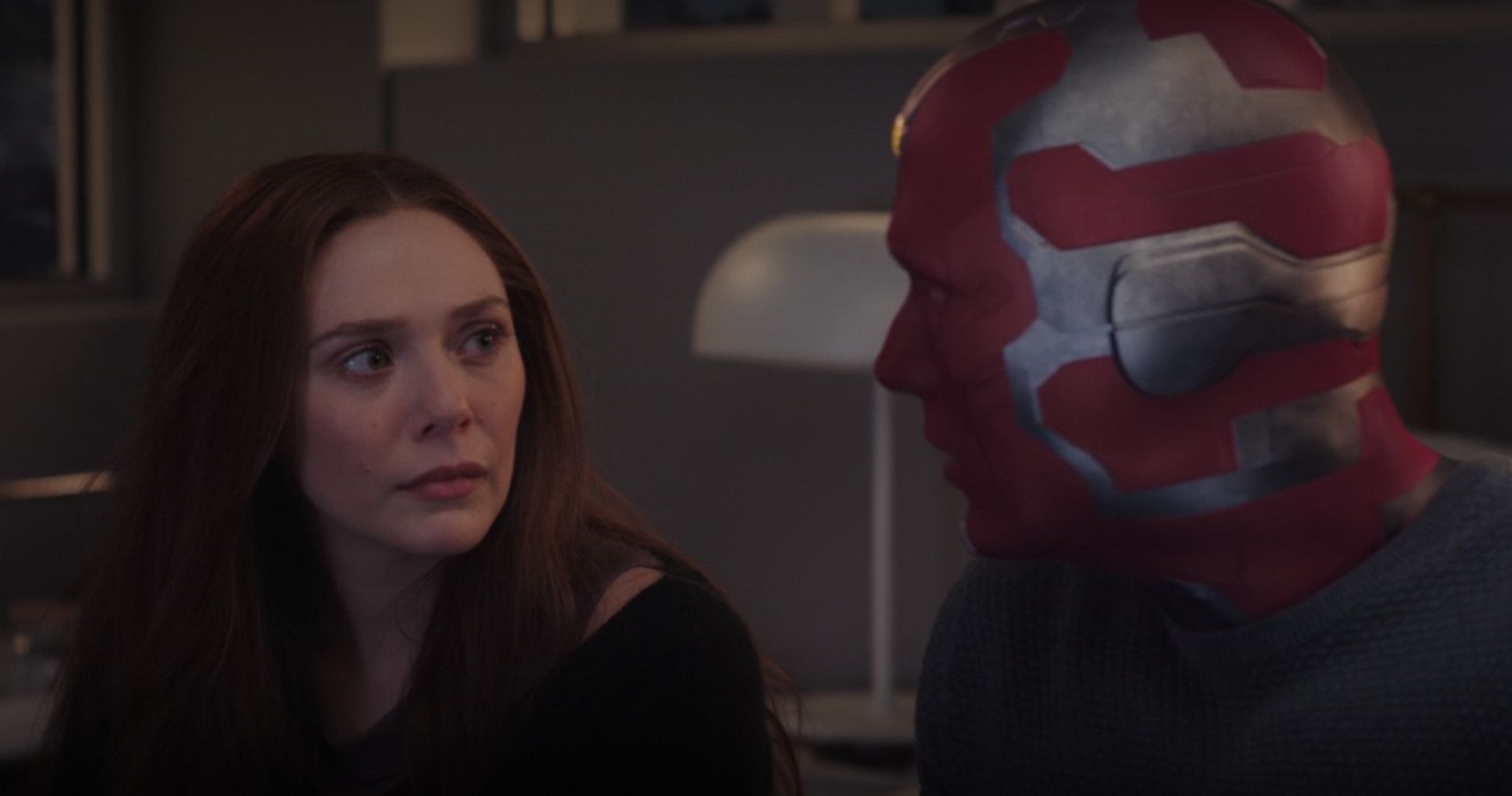WandaVision’s penultimate episode delivered one gut punch after another as Wanda revisited all of the trauma and formative experiences that turned her into a being of spontaneous creation. Wanda’s life is defined by loss: the loss of her parents in the bombing of Sokovia, the loss of her freedom to the control of Hydra, and the loss of her brother during Age of Ultron. Loss is practically all she has ever known, until she meets Vision. In the episode’s only hopeful flashback, Vision comforts Wanda after the death of Pietro. The newly-synthesized AI is able to commiserate with Wanda’s profound loneliness in a way no other Avenger can, and in a short monologue, he offers the Scarlet Witch a way forward:
“It can’t all be sorrow, can it? I’ve always been alone, so I don’t feel the lack. It’s all I’ve ever known. I’ve never experienced loss because I’ve never had a loved one to lose. But what is grief, if not love persevering?”
That last line is something WandaVision viewers have really clung onto online, and while the fanfare over this scene has become rather hyperbolic — I don’t suspect it made screenwriters everywhere resign themselves to mediocrity — it’s no surprise that so many people have been so moved by this sentiment. A lot of jaded people want to castigate “uncultured” Marvel fans for connecting to Vision’s words, but I don’t believe it is the case that something must be written in an old book to be profound or resonate with people. Considering the last 12 months, it isn’t hard to see why “love persevering” has made such an impact on so many people.
Grief is probably one of the most commonly explored themes in media. From C.S. Lewis’s A Grief Observed to Pixar’s Up, the experience of loss has been examined and re-examined countless times. For the most part, dealing with grief is represented as a long, painful journey towards learning to move on and let go. As the expression goes, time heals all wounds. This is how grief is typically “resolved” in books and films. As Ron Livingston’s character Rob tells Jon Favreau’s Mike in Swingers: “It’s like, you wake up every day and it hurts a little bit less, and then you wake up one day and it doesn’t hurt at all.”
In his novel, Memoirs of a Geisha, Arthur Golden expresses a similar sentiment about grief. “Grief is a most peculiar thing;” he writes. “We’re so helpless in the face of it. It’s like a window that will simply open of its own accord. The room grows cold, and we can do nothing but shiver. But it opens a little less each time, and a little less; and one day we wonder what has become of it.” In her 2006 memoir, Eat, Pray, Love, Elizabeth Gilbert described grief like being lost in the woods: “Deep grief sometimes is almost like a specific location, a coordinate on a map of time. When you are standing in that forest of sorrow, you cannot imagine that you could ever find your way to a better place. But if someone can assure you that they themselves have stood in that same place, and now have moved on, sometimes this will bring hope.”
Whether it’s a window that slowly closes or a forest you can’t find your way out of, grief is almost always portrayed as a state of being that one must escape. Grief is pain, but with enough time and support from others, you can leave that pain behind.
Vision offers a different path, however. As he explains it, grief is not a consequence of loss, but rather your love living on, persevering. He helps Wanda to embrace her grief, rather than try to run from it or wait for it to pass. It’s an important scene that lays the foundation for their relationship, but for those that have experienced loss recently, his words can offer us a way forward, too.
Everyone deals with grief in their own way, but the most common healthy lifestyle behaviors can provide a strong foundation to help people cope. Going to the gym, getting lots of sunlight, eating healthy, staying busy, focusing on hobbies, and perhaps most importantly, developing strong social bonds with other people. Unfortunately, a lot of these things became a lot harder, if not impossible, during the pandemic. 2020 was a year of tremendous loss for so many people, but processing that grief in a healthy way is its own challenge when it still isn’t even safe to physically meet with friends and family. Vision’s words resonate with people because, in a small and poetic way, they validate those feelings. I don’t think there’s anything basic or cringe about seeking that validation, whether it’s from a literary classic or a sentient robot created by chaos magic on a Disney show.

